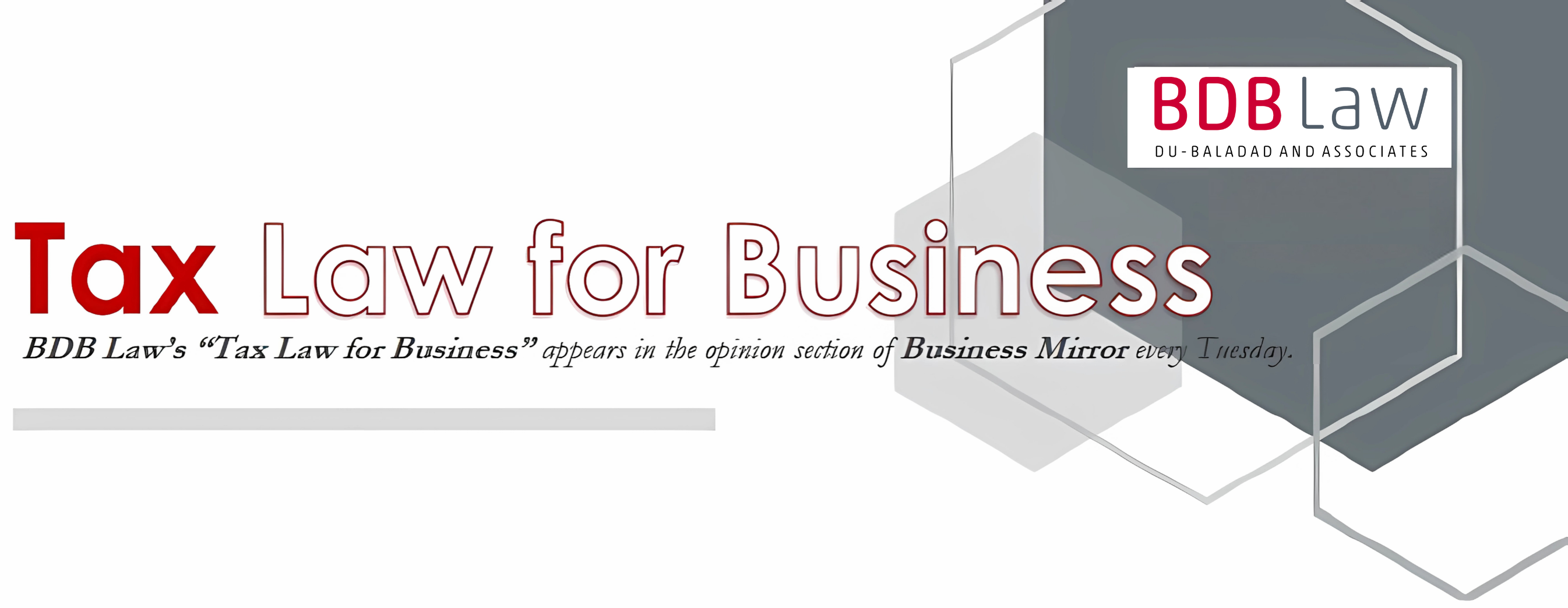
Do not Ghost the BIR
By: Atty. Irwin C. Nidea, Jr.
"Section 266 penalizes any person who, without valid justification, fails to comply with a duly issued summons from the BIR. This includes ignoring an order to appear, refusing to testify, or failing to present required documents. The penalties? A fine of up to ₱5,000 and imprisonment ranging from one to two years. While the monetary fine may seem modest, the prospect of incarceration—even for a year—can have significant and lasting consequences for one's personal and professional life."
 Irwin C. Nidea Jr. +632 8403-2001 loc.330 |
Picture this: you receive a letter from the Bureau of Internal Revenue (BIR) marked "Subpoena Duces Tecum" (SDT). It’s not a tax assessment —just a formal request for you to appear or submit certain records. Thinking it’s not urgent, you set it aside. A few months later, you’re facing criminal charges. This is not an exaggeration; it’s a real consequence under Section 266 of the National Internal Revenue Code (NIRC)—a provision that BIR officers are now enforcing with growing frequency.
Section 266 penalizes any person who, without valid justification, fails to comply with a duly issued summons from the BIR. This includes ignoring an order to appear, refusing to testify, or failing to present required documents. The penalties? A fine of up to ₱5,000 and imprisonment ranging from one to two years. While the monetary fine may seem modest, the prospect of incarceration—even for a year—can have significant and lasting consequences for one's personal and professional life.
 The courts have consistently upheld the seriousness of this offense. In various cases, taxpayers have been convicted and sentenced to both fines and imprisonment. It's also important to understand that intent is not a defense. Under our laws, failure to comply with a BIR summons is a mala prohibita offense—meaning that the act is punishable regardless of whether the taxpayer meant to violate the law.
The courts have consistently upheld the seriousness of this offense. In various cases, taxpayers have been convicted and sentenced to both fines and imprisonment. It's also important to understand that intent is not a defense. Under our laws, failure to comply with a BIR summons is a mala prohibita offense—meaning that the act is punishable regardless of whether the taxpayer meant to violate the law.
Are there defenses available? Yes—but they are limited. Valid excuses may include defective SDT or demonstrable lapses in due process. You cannot also be required to submit what you do not have. Mere confusion, fear, or misunderstanding of the notice will not stand in court.
BIR procedures on service of summons are guided by Revenue Memorandum Order (RMO) No. 8-2014, which outlines strict requirements. The preferred method of serving an SDT is through personal delivery at the taxpayer’s registered address. Service at a known (but unregistered) address is considered only as a secondary measure.
In certain cases where personal service is not possible, substituted service may be allowed—but with stringent safeguards. The revenue officer must be accompanied by a barangay official and two disinterested witnesses (individuals of legal age who are not BIR employees) who can personally observe and confirm that the taxpayer is not present at the registered address. Only when this absence is clearly established can the SDT be left with the barangay official. Moreover, these details—including the names, positions, and signatures of the witnesses—must be properly recorded on the face of the SDT itself.
Only after personal service (and possibly substituted service) has been attempted and failed, that service by mail may be utilized. There must be documentation of prior attempts to serve personally. The SDT must be sent via registered mail to the registered address of the taxpayer. A registry receipt and proof of mailing must be kept by the revenue officer as evidence of compliance.
Taxpayers must realize that a Subpoena Duces Tecum is not just another piece of paperwork—it is a legal order backed by criminal penalties. Whether you are an individual, a sole proprietor, or a corporate officer, compliance is not optional. The Bureau of Internal Revenue is increasingly using this tool to compel cooperation, and both the Court of Tax Appeals and the Supreme Court have upheld penalties of fine and imprisonment for non-compliance.
Rather than risk fines, imprisonment, taxpayers are strongly encouraged to respond to an SDT promptly and in good faith. It is even better that the first and final notices of the BIR to submit documents are not ignored. So, the BIR will not be forced to issue an SDT. In tax matters, silence is seldom golden, and delay can be costly. Cooperation, on the other hand, protects not just your finances but your peace of mind.
The author is a senior partner of Du-Baladad and Associates Law Offices.
The article is for general information only and is not intended, nor should be construed as a substitute for tax, legal or financial advice on any specific matter. Applicability of this article to any actual or particular tax or legal issue should be supported therefore by a professional study or advice. If you have any comments or questions concerning the article, you may e-mail the author at This email address is being protected from spambots. You need JavaScript enabled to view it. or call 8403-2001 local 330.



